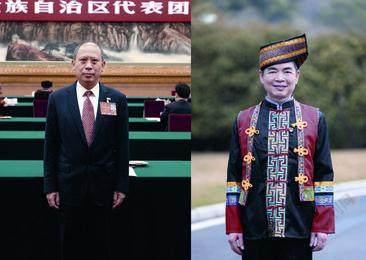DEFENDERS OF THE FIELD
2022-05-31ByLuYan
By Lu Yan
A plant protection scientist for nearly four decades, Wang Huasheng has been busy producing technological innovations to overcome farming trials and tribulations.
Wang is deputy director of Guangxi Zhuang Autonomous Region’s Plant Protection General Station. He is also a deputy to the 13th National People’s Congress(NPC), the world’s largest parliamentary body, to which he can submit proposals on behalf of his community. “I’m honored to have contributed to the amendment of China’s Seed Law,” he told Beijing Review while attending this year’s NPC session in Beijing. The amendment went into effect on March 1, strengthening the protection of the legal rights and interests of owners of new plant varieties.
“The duties I perform as NPC deputy will always be based on my own work and in line with the law. I will continue to convey the concerns of people in the rural areas to the authorities and promote plant protection,” Wang said.
In recent years, a fruit fly pest has affected Guangxi’s fruit production.“The flies prove a tough enemy. Without effective measures, farmers will have nothing to pick when harvest rolls around,” Wang said.
With the support of government funding, Wang and his team launched a research and development project. After studying the fly, they developed a bait that lured and killed more than 90 percent of the orchard’s pests. The bait is easy to use and does not affect produce quality.
After seeing local improvements, Wang decided to take his technique and insecticide nationwide. He brought a proposal based on his work results to this year’s NPC sessions, where lawmakers discuss bills and proposals reflecting people’s concerns and suggestions.
“The next step is large-scale application, during which we want to make the method more effective and affordable so fruit producers can enjoy a great harvest and increase their income; and customers can get better-quality fruit,” Wang said.
The No.1 Central Document for 2022, released in February, stipulates that the country should promote eco-friendly prevention and control products and technologies for crop diseases and insect plagues.
The first policy statement released by China’s central authorities every year, the document is considered an indicator of policy priorities. Work on agriculture and undertakings in rural areas have featured high on the agenda for 19 consecutive years.
During his years as a lawmaker, Wang has presented several suggestions to relevant authorities on the topics of food security, plant disease prevention and control, crop variety approval and new fruit variety protection. The recommendations Wang has made are based on consultations with farmers during field visits, and his many years of research.
Last year, he was invited to visit villages in Hainan Province and Guangxi to survey their crop protection system, and look into potential improvements in both the system and local ecology protection.
The surveys were part of NPC efforts, supported by the Ministry of Agriculture and Rural Affairs and other authorities, to gather data before revising the Seed Law. Through multiple rounds of detailed inspection and research, public opinion polling, evaluation meetings and discussions, a draft law was formulated and subsequently deliberated by the 13th NPC Standing Committee last August.
The Standing Committee then solicited feedback to the draft amendment on several occasions. Wang took advantage of the opportunity at hand and gave his professional input. He suggested that the law should stress the improvement of seed resilience, in addition to their yield and quality.
“Variety matters greatly. Disease-resistant types can cope with problems that only occur months or years later,” he said.
In December 2021, the NPC Standing Committee adopted the amendment to the Seed Law. The revised law adds provisions regarding the protection of new plant varieties, and the intensification of scientific and technological research in the seed industry to promote innovation-driven progress.

Like Wang, Chen Baoshan is an agricultural scientist and NPC deputy from Guangxi. As director of the Guangxi-based State Key Laboratory for Conservation and Utilization of Subtropical AgroBioresources, his main professional objective is to improve the breeding and cultivation of sugarcane. A scientist and a lawmaker, Chen considers his job a bittersweet one.
“Sugar is one of the most important raw materials in the food industry. Of China’s every three spoons of sugar, two stem from Guangxi,” he said.
According to Chen, China has achieved several key breakthroughs in refining sugarcane yield, sugar content and lifespan. Previously, a sugarcane crop could be harvested for three years before needing replacement. Chen and his team have managed to double that time to six years. “This has significantly reduced farmers’costs,” he said.
By working closely with farmers, Chen and his colleagues have also identified several challenges facing producers and industry stakeholders alike. These include natural and environmental factors preventing plants from reaching their potential, a lack of targeted preferential policies to encourage growers to invest in soil improvement, as well as inefficient harvesting methods and processing techniques.
“We must keep up the work to ensure the profitability of growing sugarcane stays on the rising curve. As long as farmers are earning enough to live well, they will be able to continue on the path toward rural vitalization,” Chen added.
As a deputy to the 12th and 13th NPC, Chen has been collecting suggestions from farmers, sugar refineries and scientists via letters, field investigations and surveys for almost 10 years.
“Every year, a team of deputies visits the places where people report problems. We identify the sources of the issues, work with local authorities to come up with targeted plans, and later on we make sure the problems have been properly solved,” Chen said.
For instance, in response to some community feedback last year, a group of lawmakers, including Chen, visited a county in Guangxi to supervise the upgrading of wastewater treatment facilities. Villagers had reported that the area’s dysfunctional sewer pipes were severely affecting the environment and consequently the quality of local life. However, through their role as NPC deputies, Chen and his colleagues were able to come up with a solution that met community needs and expectations.
“This kind of progress is then seen by neighboring villages and serves as a good example, leading them to look for ways to improve their own surroundings. It’s a ripple effect,” he said.
Chen’s efforts are also part of a rural vitalization strategy first proposed in 2017. China is working on consolidating and extending its achievements in poverty alleviation and driving rural vitalization following the nation’s 2020 victory over absolute poverty.
According to a government work report delivered by Chinese Premier Li Keqiang at the opening of the Fifth Session of the 13th NPC on March 5, China will refine and strengthen its policies supporting agriculture, continue to promote the development of areas lifted out of poverty, work to warrant good harvests, and stimulate rural income growth.
“Rural vitalization is entering a new stage characterized by highefficiency agriculture and increased agricultural mechanization,” Chen concluded, adding that the application of smart technology, too, will be scaled up. BR
